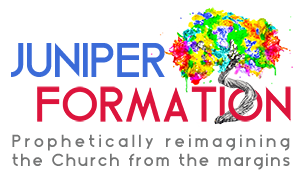Our Approach
Liberation
Juniper Formation is invested in shared liberation and disrupting the cornerstones of oppression. We are committed to radical love and justice for the diversity of God’s creation, especially the marginalized and oppressed. Our church is women- and nonbinary-led, multiethnic and antiracist, affirming of undocumented neighbors, celebrating of different abilities, and Open & Affirming of LGBTQ+ individuals and families in the life, leadership, and sacraments of our church. We are centering the margins of the Church.
Our ministry and financial model prioritizes people and relationships. In practice, this means:
A progressive, just, and equitable staff compensation structure;
Supporting people starting new ministries by cocreating ministry projects together and offering contract pay and ministry project expenses;
Leveraging our financial resources to address historical and present-day wealth inequality and discrimination in the Church;
And centering the margins of the Church in ministry.
Our church ministry is supported by donations, grants, and fees for services.
Relational Discernment
Juniper Formation is rooted in the concept of relational discernment that moves beyond ecclesial hierarchy and responds directly to the scriptures in which Jesus promises the disciples another advocate, the Holy Spirit, “You know truth, because the Spirit abides with you, and Spirit will be in and among you (John 14:17b).”
Juniper Formation’s approach emphasizes that the Holy Spirit is in and among us, meaning that it is in relationship that we can learn to experience the movement of the Holy Spirit and cocreate ministry together.
Juniper Formation's ongoing practice of relational discernment leads to an embodied clarity of values, mission, ministry, and embodied faith, while recognizing changing social and cultural contexts through the lived experiences of our neighbors and self. It is a practice that identifies spiritual gifts and Calls to ministry, and seeds new and restructured ministries, organizational cultures, governance models, and community-congregational shared ministry partnerships.
How We Work & How We Work with Others
Juniper Formation’s approach to helping congregations and new ministries thrive brings together worshipful Christian practice, cultural capacities, relational community organizing practices, lay and clergy ministry formation, and ministerial presence. Key aspects of Juniper Formation’s approach are:
Spirit-led: We know and trust that the Holy Spirit is at work and the gifts of the Spirit are present. The Spirit invites deep understanding and the opportunity for prophetic imagination, innovation, cocreation, and transformation.
Relational: One of our key practices is relational discernment—seeking out the movement and gifts of the Holy Spirit within relationship to one another. We prioritize spending time with congregations and communities to develop meaningful relationships that build trust and openness while encouraging Spirit-led growth and transformation.
Contextual: Every congregation has its own stories, experiences, relationships, communities, theologies, and liturgical traditions. We take time to learn and minister to one another within each congregation, absorbing the context and stories of those present to help facilitate our process. We do not provide a “one-size fits all” solution. We are about exploring faithfully together with the Spirit.
Abundant/Asset-based: In relationship, we enjoy and trust the abundant gifts of the Spirit and God’s creation. Instead of living in fear of scarcity, we choose to live with a faith-filled approach that helps open the door to prophetic imagination and innovation.
Accompaniment: We’ve discovered that honest and faith-filled formation and transformation occur through ongoing accompaniment. Prophetically reimagining the Church can’t be done in one weekend, one workshop, or one consultation. We follow the model of Jesus’s ministry, which included ongoing accompaniment in and with various local communities. In this process, we also teach congregations how to better accompany one another in discipleship by facilitating the deepening of relationships within and between the church and the wider community.
Cocreative: We engage in deep listening, reflection, discernment, and invite congregational expertise and cocreation—rather than offering a top-down, expert-driven model.
Worship-ful: What we do is ministry and it is always worship—not business consulting. Reconnecting congregations to Christian practice and ritual is a keystone of our ministry in connecting to the sacred and one another for belonging, healing, and transformation.
